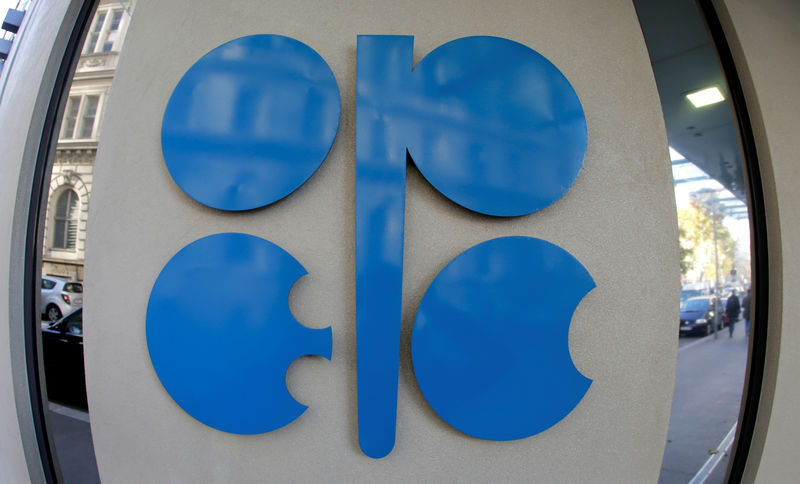By Rania El Gamal
DUBAI (Reuters) - OPEC and its allies are unlikely to agree an official increase in crude output when they meet in Algeria this weekend, although pressure is mounting on top producers to prevent a spike in oil prices ahead of new U.S. sanctions on Iran, OPEC sources said.
OPEC kingpin Saudi Arabia is worried that any sanctions-related spike in oil prices will trigger fresh criticism from U.S. President Donald Trump but is concerned about a lack of spare oil capacity to offset shortages, the sources said.
The kingdom is caught between a rock and a hard place, seeking to prevent prices from rising far above $80 a barrel ahead of U.S. congressional elections while fending off doubts over its ability to compensate for a drop in Iranian supply.
"It's complicated. Saudi Arabia has to balance oil supply and demand, and it has to balance oil prices so they don't rise too much before the U.S. elections," one OPEC source said.
"It's also political because the Saudis don't want to pump too much oil then the Iranians complain to OPEC that it (Saudi Arabia) is taking (Iran's) market share. They also don't want oil prices to fall too much."
Trump took aim at OPEC on Thursday, writing on Twitter: "We protect the countries of the Middle East, they would not be safe for very long without us, and yet they continue to push for higher and higher oil prices! We will remember. The OPEC monopoly must get prices down now!"
Under pressure from the U.S. president, the Organization of the Petroleum Exporting Countries, Russia and other allies agreed in June to boost production by 1 million barrels per day, having participated in a supply-cutting deal since 2017.
The so-called "OPEC+" coalition meets on Sunday in Algeria to discuss how to allocate that 1 million bpd increase within its quota framework.
OPEC sources say there is no immediate plan for any official action as such a move would require OPEC to hold what it calls an extraordinary meeting, which is not on the table.
The weekend gathering will discuss how to share the previously agreed output increase and examine whether the market needs more oil to offset the loss of Iranian supply as well as a decline in Venezuelan output, the sources said.
Two sources said the meeting could produce a recommendation on dividing the increase, as most participating countries would be represented.
"There are no proposals for an extraordinary meeting in Algeria," another OPEC source said.
The source added that the joint OPEC and non-OPEC ministerial committee known as the JMMC, which meets in Algiers on Sunday, can still recommend to the wider coalition a further increase in output if needed.
A separate OPEC source said: "To make a decision, you need to have all the ministers. Not all ministers are attending but most delegations will be represented."
WHO CAN RAISE OUTPUT?
U.S. sanctions on Iran's oil exports come into force in November, with supply from the country already at two-year lows. Falling Venezuelan output and unplanned outages elsewhere will also keep the supply-demand balance tight.
Fears over supply shortages have boosted crude prices in recent weeks, and international benchmark Brent (LCOc1) was trading above $79 a barrel on Thursday.
Washington wants to cut Iranian oil exports to zero by November and is pushing Saudi Arabia, other OPEC members and Russia to pump more to meet the shortfall.
OPEC and industry sources told Reuters that Chinese, Indian and other Asian refiners had been asking Middle Eastern producers such as Saudi Arabia, Iraq, the United Arab Emirates and Kuwait for more cargoes.
While some producers face supply restrictions due to infrastructure constraints or a desire not to be seen as flooding the market, others are quietly boosting exports to Asia, the sources said.
Though OPEC production has increased since July, Saudi Arabia has added less crude than it initially indicated.
Saudi officials believe there is insufficient oil demand so far to justify raising Saudi output much beyond the roughly 400,000 bpd that it has pumped above its 10 million bpd target, OPEC and industry sources told Reuters.
But that has raised some doubt over whether Riyadh can quickly boost output to what the kingdom says is its maximum sustainable capacity of 12 million bpd, the sources said.
Though Saudi Arabia has never tested such high levels, it has said it pumped 10.7-10.8 million bpd in the past.
Industry sources familiar with Saudi oil plans say state energy giant Aramco can raise output quickly to 11 million bpd, but reaching 12 million bpd could take up to six months.
Spare capacity refers to a producer's ability to ramp up production in a relatively short time. Much of it is located in the Middle East.
OPEC Secretary-General Mohammad Barkindo, meanwhile, warned this week of underinvestment in the global oil industry.
"We have seen a contraction in the level of investments in the last couple of years in response to the impact of the downturn," Barkindo told Reuters TV in an interview, referring to a drop in oil prices that started in 2014.

"It is our hope that with the gradual return of confidence in the market we will be able to see a higher level of investment in the industry, that will ensure that at any given time a certain level of spare capacity will serve us as a buffer against volatility."